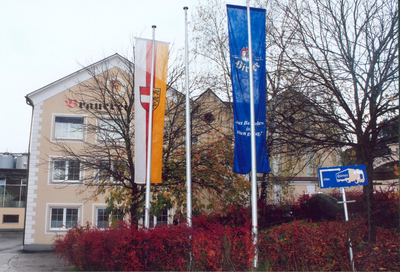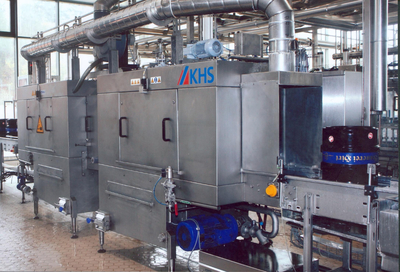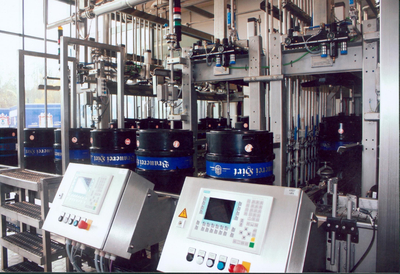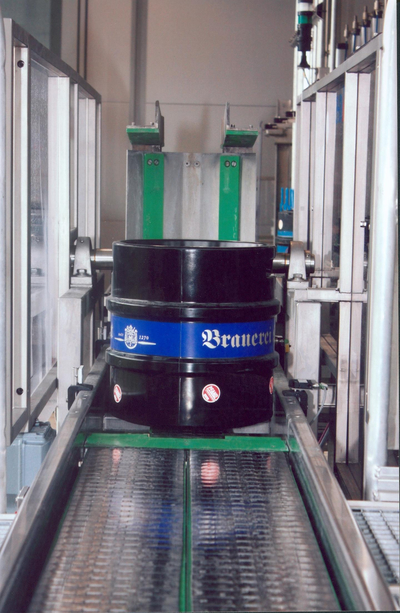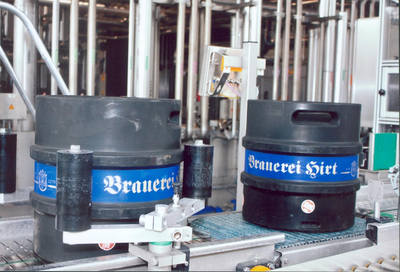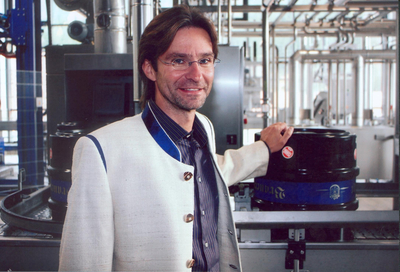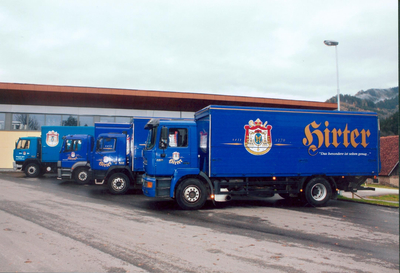
Focus on Quality of Products and Service
Austrian Brauerei Hirt invests once again in KHS keg technology
Günter Unkrig*
Ralph Pohl**
Familiar to 80% of the population, Brauerei Hirt is one of the most popular breweries in Austria. And not without good cause. One reason for its fame is the excellent quality of its products and services. The company also profits from its extremely advantageous location – which frankly couldn't be better. Hirt flanks the federal highway from Carinthia to Vienna that, traveling in the opposite direction, constitutes one of the major links between Austria and Italy. Hirt's manager Dietmar Kert, MS, says "Practically everybody in Austria has passed our brewery at some time or another and almost all of them have stopped off at our Hirter Braukeller. This is what binds us to our clientele." Those who have savored and enjoyed Hirt's quality beer in its historic brewing cellar – and this has been confirmed – also choose a Hirt brand when dining out. The restaurant distribution channel thus chalks up over 50% of total brewery sales. This is something of a record for Austria, where beer sales in the restaurant and food sectors otherwise reach just 30/70. Kert claims "Because of our strong orientation toward the restaurant trade, we fill about 40% of our beers in kegs." It goes without saying for Brauerei Hirt that top-quality beer demands top-quality keg filling technology. It's thus hardly surprising that when the time came to invest in a new keg line, the brewery once again opted for KHS keg systems. "We simply exchanged an older KHS keg line – that incidentally worked perfectly right up to its final day of operation – for the latest in KHS keg technology", says Kert. One of the interesting things here is the location of the new KHS keg line. It has been installed in a section of the building just recently finished and can be clearly seen from the federal highway. KHS keg equipment thus even communicates directly with the consumer. "This is exactly our intention", explains Kurt. "After all, the visual appearance of the line is convincing – and has the potential to convey our philosophy of quality straight to the customer."
* Director, Central European Sales Region, KHS AG, Dortmund,
Tel.: +49 (231) 569-1602
** Manager, KHS Austria, Wiener Neudorf,
Tel.: +43 (2236) 625 10-221
Incidentally, at night, the new KHS keg line is even illuminated in Hirt blue. This ensures that the wonders of keg technology continue to be perfectly communicated to the outside world – even after dark.
Historic brewery completely family owned
The origins of Brauerei Hirt lie in a joint brewery-restaurant venture that was first documented in 1270. The brewery was then also a tavern servicing one of the eight stop-off points for the mail coach traveling from Vienna to Venice. The history of ownership of one of the oldest breweries in Austria – which is still completely family owned – can be traced back without interruption to 1460.
Annual sales of 160,000 hectoliters
Even though the odd medieval traveler occasionally took a jug of Hirt beer with them on their journey, for a long time Brauerei Hirt's area of distribution was limited. This was largely because of what was known in Austria as the beer cartel, in force until 1979, which only permitted breweries to sell their beer within a radius of 30 kilometers or 18 miles. Kert remarks "We still managed to steadily increase our beer sales during this period. Where sales totaled a mere 10,000 hectoliters in the 1940s, by 1979 we had managed to top the 60,000 hectoliter mark." One of the reasons was that nearly everybody in Austria knew the little village of Hirt and its associated brewery so well from their travels that after the cartel was lifted, sales continued to rise. In 1990, the establishment sold 120,000 hectoliters of beer; its sales figures have now climbed to approx. 160,000 hectoliters a year.
Strong presence in the food and restaurant trade
Hirt's area of distribution has continued to grow since 1979. It first branched out towards Vienna, with Upper Austria, Salzburg, Tirol, Burgenland, and Styria soon following. The brewery is now the only medium-sized, privately owned producer of beer in Austria to distribute nationwide and has a strong presence in both the food and restaurant trade. Nearly all Austrian food retailers include Hirt beers in their range of goods. These are distributed by specialized beverage wholesalers. With a total of 33 partners in Austria, the brewery can fall back on a sophisticated distribution network.
Market leader for Pilsner in Austria and at the same time brewer of specialties
Brauerei Hirt still sees itself as a brewer of specialties. Ninety percent of the total beer consumption in Austria is attributable to Märzenbier, a strong, dark bock beer. Hirt is turning this to its advantage. Eighty percent of total sales is allotted to Hirt Privat Pils, for example. With a 22% share of the Pilsner trade, Brauerei Hirt is the leader of this segment of the market. The remaining 20% of Hirt's total sales are divided up between nine other brands of beer and Radler or shandy. One which is totally different from the others is Hirter 1270, a beer which gets its unmistakable amber coloring from gently roasted, caramelized brewing malt and which has a finely attuned malty taste. Another interesting variety is Hirter Morchl, made with dark brewing malt, hops and caramel malt, and distinguished by its malty, rather dry initial taste and lightly bitter finish. Hirt is also something of a pioneer in the organic beer category. Over ten years ago, it was the first brewery in Austria to launch Hirter Biobier, now complemented by a second organic product which goes under the name of Hirter Biohanfbier. The student contingent is particularly fond of Hirter Twist Off, a strong beer that smacks of Märzenbier and that, as the name suggests, is quick and easy to open.
Comprehensive service for the catering sector
In the catering sector, not only the quality of the product but also the quality of the service are of great importance. Brauerei Hirt has much to offer here. The company advises its customers right across the board, from product training to tapping beer and proper glass care to drawing up package concepts for taverns and restaurants. Hirt is happy to share its expertise with its client proprietors. "We see ourselves as a partner who's ready to help with any queries that might crop up", says Kert. "As a rule, we don't simply consider ourselves to be a manufacturer but rather a provider of services who can supply the all-round package required for all channels of distribution."
Twelve percent exported
Both in Austria and abroad, Brauerei Hirt has been actively exporting since the 1990s. Around 12% of total sales now cross the border, destined chiefly for Italy, Slovenia, and Croatia. The idea here is to unobtrusively follow the Austrians to their favorite vacation spots. As at home, the focus here is on the catering trade – and thus the keg.
Not going with the flow
It thus figures that the Hirt brewery has managed to notch up a growth in sales in the keg sector while many other Austrian breweries complain of decreasing sales here. As Kert professes, "We are deliberately going against the flow and have even noticed a slight increase in sales in the bottled beer segment."
Refillable glass bottles and kegs are the prime containers
In the bottled beer segment, refillable glass bottles are still the hot favorite with consumers, with 90% of sales allocated to the same.
The winner here is the 0.5-liter refillable glass bottle, with the 0.33-liter glass container king of the non-refillables. The brewery deals in kegs holding 50, 30 and 15 liters, 60% of which are the 50-liter variety, 25% the 30-liter type, and 15% the 15-liter keg. Simpler handling for the restaurant trade means that the 15-liter version is on the up and up. In addition, Austrian restaurateurs like to have a variety of beers on tap. The little space required by the 15-liter keg makes this possible.
One hundred percent KHS equipment
Regardless of the containers used, to do justice to Hirt's philosophy of providing the utmost quality only the best in system equipment can be used for all Hirt beers and non-alcoholic beverages. The brewery thus invested in a multifunctional KHS glass line in the mid-1990s, a setup that can cope with 33,000 0.33-liter and 30,000 0.5-liter bottles an hour. The system processes both refillable and non-refillable bottles of different sizes, bottling not just beer but also the company's range of non-alcoholic beverages that consists of Hirter Malzmandl malt soda pop, Hirter Ravilla lemon cola, Hirter Almrausch herbal soda pop and Kärntner Wassergold mountain spring water.
Line capacity of 240 kegs per hour
The new KHS keg line is designed to fill up to 240 kegs per hour. It handles 15, 30, and 50-liter kegs – the brewery's full keg range. All of Hirt's quality beers are filled in kegs; according to Kert, "This enables those in the catering sector to specifically choose between different styles of beer and to preferably include several of them in their range of products."
Depalletizing and flexible exterior washing
In the line, empty kegs that have been returned on pallets are first depalletized. During the depalletizing process, the position of fittings is checked and – if necessary – the kegs turned. The kegs then pass along the conveyor to the Innokeg AK 3 exterior keg washer.
The Innokeg AK 3 can be adjusted infinitely variably to various keg sizes without production being interrupted. The exterior washing process is carried out over several zones. The kegs are pre-washed with a caustic solution and mixed water. During the pre-washing process, coarse soiling is removed from the sleeve area and the shoulder of the keg. The spray patterns of the spray nozzles can be perfectly adapted to suit the type of keg being washed
Main keg washing initially takes the form of intensive caustic treatment that removes labels, among other things. This is followed by a further main wash of the keg using mixed water. Labels are specifically and reliably removed using the high-pressure spray module by high-pressure rotating nozzles. Brush stations equipped with spinning brushes give the keg exteriors an additional mechanical clean. The final stage in the external keg washing process is to rinse the kegs with fresh water.
Working hand in hand: the Innokeg TRANSOMAT 5/1 Duo and Innokeg TRANSOMAT 5/1 Mono
Next, the kegs travel on to the keg washing and filling machines. The first of these is an Innokeg TRANSOMAT 5/1 Duo that has two washing and filling sections. The second is an Innokeg TRANSOMAT 5/1 Mono that has just one washing and filling segment. Each of the three washing and filling sections is equipped with one filing station and five active washing and sterilizing stations, plus one passive caustic soaking station. What's more, each of these three machines has a capacity of 80 kegs per hour. The concept incidentally also accounts for a possible increase in keg sales in future. If required, the Innokeg TRANSOMAT 5/1 Mono can easily be turned into an Innokeg TRANSOMAT 5/1 Duo by simply adding a second filling section.
Interior keg washing with pulsating sprays
The kegs are checked for residual pressure at the first Innokeg TRANSOMAT 5/1 Duo or TRANSOMAT 5/1 Mono stations. If this proves negative, the relevant keg is channeled out. The first step in the keg washing process involves blowing out any remaining beer with sterile air. This residue is driven out through the ring channel. This is followed by washing with mixed water to remove coarse particles of dirt such as dried-on beer residue. Mixed water is water collected from the last hot water spray during the washing process. Water, wastewater, and also energy savings are the decisive advantages of this system. The main keg wash involves the use of two caustics and an acid in a pulsating spraying process. This produces an outstanding cleaning action on the inside surface of the keg. This stage is followed by a rinse with hot water to reliably remove any clinging residue of cleaning agent in the keg, and a final blowout with steam. This final blowout with steam is done for two reasons. Firstly, any germs still existing are reliably killed and the cask is sterile. Secondly, steam minimizes the oxygen content in the keg. This provides optimum conditions for the low-oxygen filling process.
Best washing results coupled with high environmental friendliness
The washing process described above gives the best cleaning results while cutting costs and being friendly to the environment. The fact that caustic or acid is only automatically added when conductivity measurements demand it underlines the last point in particular. A significant reduction in the use of cleaning agents is the result.
DFC® filling system minimizes oxygen pickup in the product
Brauerei Hirt has specifically invested in DFC® (Direct Flow Control) filling technology. The Direct Flow Control process ensures both the highest degree of filling precision and high filling speeds. There is no loss of product due to keg overfill, nor is underfilling a problem. At the same time – and this is a very significant point – considerably less carbon dioxide is needed for pressurizing the kegs. Savings of up to 40% (depending on the size of the container) are no rarity with Direct Flow Control, as the pressure is only built up to the necessary saturation pressure.
One of the key factors for maintaining the beer quality in the keg is minimum oxygen pickup. This is ensured by exact regulation of the volume flow at the start of the filling process, along with extremely low gas loss. Kert's view on the subject is that "For such a quality-conscious brewery such as ours, low oxygen pickup in the product is the biggest plus of KHS' innovative keg system technology."
The kegs then travel from the filler directly to the automatic full keg scales. If the keg fails to meet the given specifications, it is pushed out. The other stations the kegs pass prior to palletizing are the keg turner, the capper, and the labeler.
Optional Remote Diagnostic Service
Another highlight of the innovative KHS keg line for Brauerei Hirt is that the line is designed for KHS' ReDiS (Remote Diagnostic Service). If problems should occur with machines, a connection is established to the KHS ReDiS service center where remote analysis takes place immediately. In the best case, the particular machine problem can be easily corrected by accessing electronic system components online. If the problem involves mechanical components, the engineer at the machine is notified as to which exact actions must be taken. It is also feasible to reprogram or to download possible updates via ReDiS. All in all, the system helps boost line availability, thus offering a definite savings potential.
Kert is enthusiastic. "ReDiS is just one side of the coin; the other is that fast help from KHS is always on hand if and when we need it. As a long-term customer of KHS, we are very pleased with the high level of importance KHS attaches to service. Altogether, the company philosophy of Brauerei Hirt matches that of KHS extremely well."
Keg line with integrated safeguards for the future
With innovative KHS keg technology, Brauerei Hirt is well prepared for the great demand for its quality beers in kegs. Should demand continue to rise disproportionately, it is possible to upgrade the KHS keg system and boost productivity, as mentioned above. Hirt's keg line is thus a good safeguard for the future.
Healthy growth predicted
The per capita consumption of beer in Austria is currently about 108 liters a year – with numbers sinking. Despite a stagnation or even drop in beer consumption per capita of the Austrian population, over the years Brauerei Hirt has managed to slightly increase sales figures. "We are extremely satisfied with this result," claims Kert. "Both now and in the future, our objective is not growth for growth's sake. We are more interested in keeping up production long term, together with a healthy growth rate and constant adherence to the three components of our company philosophy: quality of product, quality of service, and a policy of high pricing."

